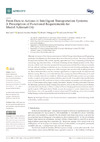Identificador persistente para citar o vincular este elemento:
https://accedacris.ulpgc.es/jspui/handle/10553/107223
| Título: | From data to actions in intelligent transportation systems: a prescription of functional requirements for model actionability | Autores/as: | Laña, Ibai Sánchez Medina, Javier Jesús Vlahogianni, Eleni I. Del Ser, Javier |
Clasificación UNESCO: | 3327 Tecnología de los sistemas de transporte 120903 Análisis de datos |
Palabras clave: | Intelligent transportation systems Functional requirements Machine learning Model actionability Model evaluation |
Fecha de publicación: | 2021 | Publicación seriada: | Sensors (Switzerland) | Resumen: | Advances in Data Science permeate every field of Transportation Science and Engineering, resulting in developments in the transportation sector that are data-driven. Nowadays, Intelligent Transportation Systems (ITS) could be arguably approached as a “story” intensively producing and consuming large amounts of data. A diversity of sensing devices densely spread over the infrastructure, vehicles or the travelers’ personal devices act as sources of data flows that are eventually fed into software running on automatic devices, actuators or control systems producing, in turn, complex information flows among users, traffic managers, data analysts, traffic modeling scientists, etc. These information flows provide enormous opportunities to improve model development and decision-making. This work aims to describe how data, coming from diverse ITS sources, can be used to learn and adapt data-driven models for efficiently operating ITS assets, systems and processes; in other words, for data-based models to fully become actionable. Grounded in this described data modeling pipeline for ITS, we define the characteristics, engineering requisites and challenges intrinsic to its three compounding stages, namely, data fusion, adaptive learning and model evaluation. We deliberately generalize model learning to be adaptive, since, in the core of our paper is the firm conviction that most learners will have to adapt to the ever-changing phenomenon scenario underlying the majority of ITS applications. Finally, we provide a prospect of current research lines within Data Science that can bring notable advances to data-based ITS modeling, which will eventually bridge the gap towards the practicality and actionability of such models. | URI: | https://accedacris.ulpgc.es/handle/10553/107223 | ISSN: | 1424-8220 | DOI: | 10.3390/s21041121 | Fuente: | Sensors (Switzerland) [ISSN 1424-8220], v. 21(4), 1121, (Febrero 2021) |
| Colección: | Artículos |
Citas de WEB OF SCIENCETM
Citations
33
actualizado el 22-feb-2026
Visitas 10
355
actualizado el 16-ene-2026
Descargas
222
actualizado el 16-ene-2026
Google ScholarTM
Verifica
Altmetric
Comparte
Exporta metadatos
Los elementos en ULPGC accedaCRIS están protegidos por derechos de autor con todos los derechos reservados, a menos que se indique lo contrario.
